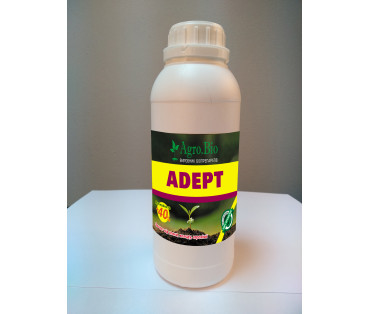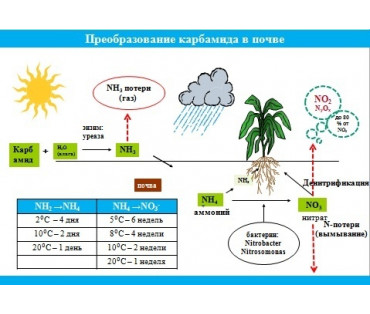Influence of microfertilizer Adept "Agro.Bio" on the development of microorganisms in the soil
At present, the effectiveness of using Adept "Agro.Bio" on medium loamy dark chestnut soil difference in the south of Ukraine is beyond doubt. Researchers approach the explanation of the positive effect of humic substances on plant growth in different ways.
There are data in the literature indicating that organic substances have a direct stimulating effect on the vital activity of plants. At the same time, other scientists believe that the positive effect of humus substances on plant growth is explained by the impact on them of the waste products of soil microflora. Scientists point out that the vital products of microbes are of decisive importance in the development of plants. As a result of research, it was found that the more humus, the more microorganisms in the soil and the more biotic substances in it - vitamins B 1 B 2 , B 3, heteroauxin, etc. There are more vitamins in plants if they grow in soil rich in microbes. They also established the stimulating effect of a soil solution containing low molecular weight organic substances, and came to the conclusion that replenishing the soil with fresh organic substances is important not only for restoring sources of ash and carbon nutrition, but also for the formation of stimulating substances by microorganisms. Humus substances are complex products
vital activity of microorganisms. Various scientists attach great importance to the products of vital activity of microorganisms in plant nutrition. They believe that, on the one hand, humic fertilizers affect the physical and physico-chemical properties of the soil and, on the other hand, directly affect the vital activity of higher plants and microorganisms. Studies conducted on dark chestnut soils of the Kherson region, when watering the soil with humus humic acid, the content of various groups of microorganisms in it increases by almost 2-3 times, while the content of nutrients in the soil also increases.
Our experiments on low-humus dark chestnut soils of the experimental control field of irrigated agriculture also indicate that Adept "Agro.Bio" to a large extent stimulates the development of soil microflora.
Our first experiments with Adept "Agro.Bio" microfertilizer were carried out in 2019.
Adept "Agro.Bio" in this experiment was introduced at the rate of 1.5 l / t of seeds
in pre-sowing cultivation for Bulgarian pepper. During the growing season, we took samples twice (June 15 and July 9, 2019) to monitor the development of the total number of microorganisms (on MPA) and Azotobacter on soil plates (Table 1).
Table 1
Influence of Adept "Agro.Bio" on the development of soil microflora
|
Experience options |
Horizon, cm |
Number of microorganisms (in millions per 1 g of soil) |
|
|
15.06 |
9.07 |
||
|
Control (no fertilizer) |
0-20 |
4.7 |
3.0 |
|
Also |
20-40 |
2.2 |
1.2 |
|
Adept "Agro.Bio" 1.5l /t seeds for presowing cultivation |
0-20 |
18.2 |
4.2 |
|
Also |
20-40 |
2.8 |
1.6 |
From the data of this table it can be seen that Adept "Agro.Bio", introduced under Bulgarian pepper, contributed to the enhancement of the development of soil microflora. As expected, the strongest positive effect of the drug on the development of microorganisms was noted in the upper soil layer (up to 20 cm). When taking samples at the beginning of summer, the difference in the number of microorganisms in the plots with microfertilizer exceeded their number in the control by almost 4 times. In early August, the number of microorganisms in the soil generally decreased, but the patterns identified during the first sampling period were preserved. We determined the amount of Azotobacter by the method of Winogradsky on soil plates.
There is very little Azotobacter in the low-humus chestnut soils of the arid steppe in the south of Ukraine. It should also be noted that Azotobacter present in these soils is not active. Evidence of this is the appearance of its colonies on natural soil plates with a great delay - on the fourth and fifth days. Our observations showed that Adept "Agro.Bio" to a large extent stimulated the development of Azotobacter on soil plates (Table 2).
table 2
Influence of Adept "Agro.Bio" on the development of Azotobacter in the soil
|
Experience options |
Horizon, cm |
Number of Azotobacter colonies |
|
|
15.06 |
9.07 |
||
|
Control (no fertilizer) |
0-20 |
224 |
116 |
|
Also |
20-40 |
12 |
4 |
|
Adept "Agro.Bio" 1.5 l / t of seeds for pre-sowing treatment |
0-20 |
750 |
124 |
|
Also |
20-40 |
16 |
10 |
Thus, Adept "Agro.Bio" has a positive effect not only on the development of the total number of microorganisms, but also contributes to the enhanced development of beneficial soil microflora - Azotobacter. The same studies were carried out by us in 2020 and 2021. During this period, we experienced the influence of Adept "Agro.Bio" microfertilizer on the development of other groups of microorganisms: ammonifying and anaerobic nitrogen fixers.
In 2021, we observed the development of soil microorganisms depending on the application of Adept "Agro.Bio" in growing vessels with a capacity of up to 12 kg with optimal moisture (50% of the total moisture capacity), as well as in a field experiment. Adept "Agro.Bio" in the amount of 3 mg per vessel was introduced to a depth of 10 cm, mixed with the soil, after which corn was sown. When 3-4 leaves were formed, the plants were taken out of the vessels and soil samples were taken for determination of microorganisms.
The results of the experiment are shown in table 3.
Table 3
|
Experience options |
Number of microorganisms (in millions per 1 g of soil) |
|||
|
at MPA |
anaerobic
nitrogen |
Ammoni- |
number |
|
|
Control (no fertilizer) |
6.7 |
0.025 |
0.025 ++ |
378 |
|
Organo-mineral mixture - 50 g per vessel. |
24.6 |
0.070 |
0.025 ++ |
440 |
|
Adept "Agro.Bio" 3mg per vessel |
29.0 |
1.110 |
0.070 +++ |
530 |
|
Note. Signs: |
+ bacterial activity ++ activity is weak +++ activity satisfactory |
|||
From the materials of Table 3, it can be seen that in the vegetation vessels, the introduction of 50 g of an organo-mineral mixture increased the number of microorganisms grown on MPA by 3.5 times compared to the control, and when the same amount of Adept "Agro.Bio" was added, it increased more than 4 times.
The organo-mineral mixture and especially Adept "Agro.Bio" have a significant positive effect on the activation of other groups of microorganisms - anaerobic nitrogen fixers, ammonifying bacteria and Azotobacter.
An increase in the activity of soil microbiological activity under corn under the influence of Adept "Agro.Bio" was also observed in the field experiment (Table 4).
Table 4
Number of microorganisms (in millions per 1 g of soil)
(10.06 2021)
|
Experience options |
Horizon, cm |
Total number of microorganisms |
Number
of |
Number of |
|
Control (no fertilizer) |
0-20 |
21.0 |
0.070 |
0.025 |
|
Also |
20-40 |
9.0 |
0.025 |
0.006 +++ |
|
Adept "Agro.Bio" 1.5 l / t of seeds for pre-sowing treatment |
0-20 |
28.0 |
0.070 |
0.060 |
|
Also |
20-40 |
31.0 |
1.110 ++++ |
0.025 +++ |
As our observations showed, the introduction of Adept "Agro.Bio" significantly increased the number and activity of microorganisms in the soil in the root zone of corn. The improvement of the microbiological activity of the soil also had a positive effect on the development and yield of corn. With the use of the Adept "Agro.Bio" preparation, a corn grain yield of 23.4 centners/ha was obtained with a yield of 21.4 centners/ha in the control.
The experiment with the introduction of Adept "Agro.Bio" in 2021 was carried out under irrigated conditions. Adept "Agro.Bio" when sowing corn was introduced at 1.5 l / t of seeds.
Data on the effect of humophos on the microflora are presented in Table 5.
Table 5
Influence of Adept "Agro.Bio" on microflora (In millions per 1 g of soil)
|
Options experience |
11.06.2021 |
23. 07 2021 |
||||
|
Total |
Number
of ammonifiers |
nitrogen fixatives |
Total |
Number
of |
Number of
anaerobic
nitrogen |
|
|
Control (no fertilizer) |
9.7 |
0.250 |
0.013 |
6.3 |
1,100 |
0.060 |
|
+ |
+ |
++ |
+++ |
|||
|
Adept Agro.Bio 1.5l/t seeds at sowing |
13.0 |
0.250 |
0.250 |
14.6 |
1,100 |
0.250 |
|
+++ |
+++ |
++ |
+++ |
|||
From the data in Table 5, it follows that the introduction of Adept "Agro.Bio" had a positive effect on the development and activity of microorganisms in the soil of the corn rhizosphere. Analyzing the materials of the same experiment on the development of Azotobacter (Table 6), we can come to the firm conclusion that Adept "Agro.Bio" creates favorable conditions for the development of these beneficial bacteria in chestnut soils.
Table 6
The number of Azotobacter colonies in 50 g of soil
|
Experience options |
11.VI |
23. VII |
|
Control (without fertilizer) ......... Application of 1.5l/t seeds ...... |
16 a lot of colonies |
16 496 |
At the first sampling date (July 11, 21), the surface of soil plates on plots with Adept "Agro.Bio" was completely covered with Azotobacter colonies. At the second sampling, the difference in the amount of Azotobacter between the plot with the introduction of microfertilizer and the control was more than 13 times. Thus, the results of three years of research allow us to conclude that the use of Adept "Agro.Bio" significantly enhances the development of soil microflora, which, as a result of its vital activity, enriches the soil with both nutrients and biotic substances that have a stimulating effect on plant development.
Related Products
Adept «Agro.Bio»
Product Adept "Agro.Bio" is an innovative solution in agriculture to support the growth and development of plants. A biostimulant based on ginseng root micromycete fungi provides a wide range of effec..
$13.00
Related Articles
The ability of plants to tolerate excess nitrogen and high temperatures
On the nature of the influence of organomineral, humic microfertilizers Mind Extra "Agro.Bio", Totem "Agro.Bio", Adept "Agro.Bio", Potassium Humate + Phosphorus "Agro.Bio" on the ability of plants to ..
Importance of soil organic matter and fertilizers for plant nutrition
For any farm, increasing the efficiency of soil fertility is of great importance.A huge amount of nutrients is concentrated in soils - in humus (humus), organic residues of plant origin and in mineral..



